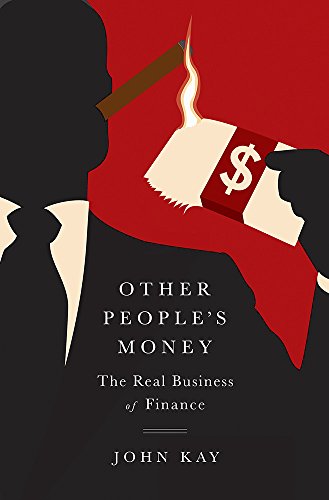
Other People's Money
The Real Business of Finance
کتاب های مرتبط
- اطلاعات
- نقد و بررسی
- دیدگاه کاربران
نقد و بررسی

August 1, 2015
All's not well in the counting house, nor in a capitalist system grown increasingly unequal and corrosive."We need a finance sector to manage our payments, finance our housing stock, restore our infrastructure, fund our retirement and support new business," writes British economist Kay (Obliquity: Why Our Goals Are Best Achieved Indirectly, 2010, etc.). By his account, we don't have a sector that does much of that necessary work; instead, intermediation, buying and selling abstractions rather than real things, is the new method. In fact, writes the author, lending to entities that make things, "which most people would imagine was the principal business of a bank," makes up only about 10 percent of the sector's business. The rest lies in intermediation, which is another way of saying that "the industry mostly trades with itself, talks to itself and judges itself by reference to performance criteria that it has itself generated." Take securitized mortgage loans, bundled and traded like baseball cards: there's a recipe for disaster, and in the absence of meaningful external oversight, it and other contributing factors to financial meltdown are not likely to be tamed anytime soon. Kay is no Chicken Little; his arguments are calmly made, backed by such evidence as can be teased out of the reclusive industry. In the meantime, he notes, many aspects of the financial sector, such as the lending and deposit channels, are "ripe for disruptive innovation," just as in recent years the increased use of credit and debit cards and other electronic tie-ins to bank accounts have made cash unnecessary in most daily transactions. Kay holds forth for increased regulation that is focused "more on the interests of consumers and less on the integrity of market processes"-in other words, the more vigorous application of Dodd-Frank and other regulatory regimes that Congress is now hurriedly trying to dismantle. Sobering and lucid. If you're moved to keep your money in a sock after reading this, you'd have cause.
COPYRIGHT(2015) Kirkus Reviews, ALL RIGHTS RESERVED.

September 1, 2015
Kay, a British economist, author, and visiting professor at the London School of Economics, has an interesting perspective on the world of finance in the United States, the UK, and Europe. While finance is necessary to modern societies, Kay considers how finance did, does, might, and should work. The book's first part includes the history of economics, as well as modern political, intellectual, and technological shifts. The second section tries to answer questions about the purpose and quality of modern financial activity. The third deals with structural reforms, intending to supply a blueprint for the future. Kay feels that regulation is part of the problem as is too much government involvement. He looks at financial crises in the United States, UK, and the Eurozone and feels that financial executives are using other people's money to enrich themselves and that baby boomers are profiting at the expense of future generations. Since policymakers did not restructure after the last crisis, Kay says they will get another chance after the next one. VERDICT Not for the merely curious. If words such as financialisation, demutualization, securitization, and intermediation are exciting, it's a definite read.--Bonnie A. Tollefson, Rogue Valley Manor Lib., Medford, OR
Copyright 2015 Library Journal, LLC Used with permission.

September 1, 2015
Kay, British economist with experience in public policy, business, and academia, discusses the nature of finance and financialization (his shorthand term for the process resulting in finance gaining a dominant economic role during the last 30 to 40 years). Today's banks and most financial institutions trade in securities, which mostly explain the finance sector's growth. Part 1 describes the causes of financialization, which include political changes; Kay comments, Little progress can be made in reforming finance unless the influence of money in politics is reduced. He addresses the purpose of finance in part 2 from the viewpoint of the market users of finance's four basic functions: making payments, matching borrowers with lenders, helping individuals handle their money, and managing risk. Part 3 covers reform, and Kay indicates there has been far too much regulation: he concludes with recommendations for a more limited financial sector and warns that there will be another major financial crisis. A challenging book that will add to ongoing discussion and debate.(Reprinted with permission of Booklist, copyright 2015, American Library Association.)

























دیدگاه کاربران